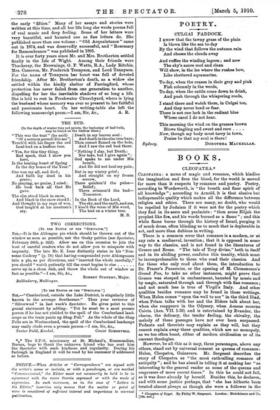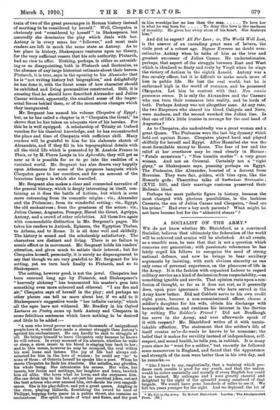BOOKS.
CLEOPATRA.* CLEOPATRA: a name of magic and romance, which kindles the imagination and fires the blood, for the world is moved far more than it suspects by romance and poetry. Poetry, according to Wordsworth, is " the breath and finer spirit of all knowledge " ; according to Arnold, it is that elusive but indispensable quality which makes all the difference between religion and ethics. There are many, no doubt, who would be repelled by Judaism if it were not for the poetry which they find in its seers and psalmists : "then arose Elijah the prophet like fire, and his words burned as a flame " ; and this white flame burns through the history of Israel, purging it of much dross, often blinding us to much that is deplorable in act, and more than dubious in writing.
There is a common error that romance is a modern, or at any rate a mediaeval, invention; that it is opposed in some way to the classics, and is not found in the literatures of Greece and Rome. " The tale of Troy divine," both in itself and in its abiding power, confutes this inanity, which must be incomprehensible to those who read their classics. And for those who only read about them, the introduction to Dr. Frazer's Pausanias, or the opening of M. Clemenceau's Grand Pan, to take no other instances, might prove that Greece was steeped in enchantment, haunted by music and by magic, saturated through and through with fine romance ; and not much less is true of Virgil's Italy. And other qualities besides romance may be found in these writings. When Helen comes " upon the wall to see " in the third Iliad, when Priam talks with her and the Elders talk about her, when she reappears in the Odyssey, when Aeneas mourns Caieta (Aen. VII. 1-36) and is entertained by Evander, the charm, the delicacy, the tender feeling, the chivalry, the melody of these passages have not ever been surpassed. Pedants and theorists may explain as they will, but they cannot explain away these qualities, which are no monopoly, as we too often boast, either of modern civilisation or of its current theologies.
However, be all this as it may, three personages, above any others, stand out by universal consent as queens of romance: Helen, Cleopatra, Guinevere. Mr. Sergeant describes the story of Cleopatra as " the most enthralling romance of antiquity "; and he has aimed in telling it at making her "as interesting to the general reader as some of the queens and empresses of more recent times." In this he could not fail, as it was done already by herself. Besides this, he declares, and with some justice perhaps, that " she has hitherto been treated almost always as though she were a follower in the
* Cleopatra of Egypt. By Philip W. Sergeant. London : Hutchinson and Co. [16s. net.]
train of two of the great personages in Roman history instead of meriting to be considered by herself." Well, Cleopatra is obviously not "considered by herself" in Shakespeare, but
assuredly she dominates the play which deals with her. Antony is in every sense her " follower," and most male readers are left in much the same state as Antony. As to
her place in history, Shakespeare ventures upon no theory, for the very sufficient reason that his sole authority, Plutarch, had no view to offer. Nothing, perhaps, is either so astonish- ing or so disappointing, both in Plutarch and Suetonius, as the absence of any large historical estimate about their heroes. Plutarch, it is true, says in the opening to his Alexander that he is " not writing history but biographies," and delightfully he has done it, with the finest sense of how character should be exhibited and living personalities constructed. Still, it is amazing that he should have described Alexander and Julius Caesar without, apparently, the smallest sense of the imper- sonal forces behind them, or of the momentous changes which they inaugurated.
Mr. Sergeant has named his volume Cleopatra of Egypt ; but, as he has called a chapter in it " Cleopatra the Great," he shows that he has taken an adequate view of his heroine. For this he is well equipped. A scholarship of Trinity at Oxford vouches for his classical knowledge, and he has reconstructed the place and time of Cleopatra with sufficient skill. Many readers will be grateful to him for his elaborate sketch of Alexandria, and if they fill in his topographical details with all the vivid life which is presented by M. Anatole France in Thais, or by M. Pierre Louys in his Aphrodite, they will get as near as it is possible for us to go into the realities of a vanished world. Mr. Sergeant has also drawn very happily upon Athenaeus for some of the gorgeous banquets which Cleopatra gave to her courtiers, and for an account of the luxurious barges in which she travelled.
Mr. Sergeant also makes a clear and connected narrative of the general history, which is deeply interesting in itself, con- taining as it does the battle of Actium, but which is even more entrancing from its romantic origins : viz., Alexander and the Ptolemies ; from its wonderful setting : viz., Egypt, the old enchantress ; from the greatness of the actors : viz., Julius Caesar, Augustus, Pompey, Herod the Great, Agrippa, Antony, and a crowd of other celebrities. All these live again with commendable distinction in Mr. Sergeant's pages. He takes his readers to Antioch, Ephesus, the Egyptian Thebes, to Athens, and to Rome. It is all done well and skilfully.
The history is sound and the scholarship satisfactory. The characters are distinct and living. There is no failure in scenic effect or in movement. Mr. Sergeant holds his readers' attention, and gives much to satiate their interest ; but for Cleopatra herself, personally, it is surely no disparagement to say that though we are very grateful to Mr. Sergeant for his setting, yet we turn back finally to Plutarch, and so to Shakespeare.
The setting, however good, is not the jewel. Cleopatra has been annexed long ago by Plutarch, and Shakespeare's "heavenly alchemy" has transmuted his master's gem into something even more coloured and ethereal. "I am fire and air," Cleopatra says of herself in the play; and perhaps no other phrase can tell us more about her, if we add to it Shakespeare's suggestive words "her infinite variety," which all the ages have not withered. Mr. Bradley in his Oxford Lectures on Poetry sums up both Antony and Cleopatra in some felicitous sentences which leave nothing to be desired and little to be added :—
"A man who loved power as much as thousands of insignificant people love it, would have made a sterner struggle than Antony's against his enchantment. He can hardly be said to struggle at all: He brings himself to leave Cleopatra only because he knows he will return. In every moment of his absence, whether he wake or sleep, a siren music in his blood is singing him back to her ; and to this music, however he may be occupied, the soul within his soul leans and listens. The joy of life had always cul- minated for him in the love of women : he could say ' no' to none of them : of Octavia herself he speaks like a poet. When he meets Cleopatra he finds his Absolute. She satisfies, nay glorifies, his whole being. She intoxicates his senses. Her wiles, her taunts, her furies and meltings, her laughter and tears, bewitch him all alike. She loves what he loves, and she surpasses him. She can drink him to his bed, out-jest his practical jokes, out-act the best actress who ever amused him, out-dazzle his own magnifi, canoe. She is his play-fellow, and yet a great queen. Angling in the river, playing billiards, flourishing the sword he used at Philippi, hopping forty paces in a public street, she remains an enchantress. Her spirit is made of wind and flame, and the poet in him worships her no less than the man To love her
is what he was born for To deny this love is the madness of morality. He gives her every atom of his heart. She destroys him."
And did he regret? All For Love ; or, The World Well Lost, is the answer of an exceeding great man of letters, the virile poet of a robust age. Signor Ferrero no doubt over- estimates Antony when he talks of him as the true and greatest successor of Julius Caesar. He underestimates, perhaps, that aspect of the struggle between East and West which is idealised so finely and truly by Virgil when he sings the victory of Actium in the eighth Aeneid. Antony was a.
fine cavalry officer, but it is difficult to make much more of him in public life. He lost the real world, but he is enthroned high in the world of romance, and he possessed Olsopatra. Let him be content with that. Non amnia
possumus ommes. It is only the Alexanders and the Caesars who can turn their romances into reality, and be lords of both. Perhaps Antony was not altogether sane. At any rate, the two Emperors who shared his blood, Caligula and Nero, were madmen, and the second wrecked the Julian line. Is
that one of life's little ironies in revenge for the cool head of Augustus ?
As to Cleopatra, she undoubtedly was a great woman and a great Queen. The Ptolemies were the last big dynasty which held out against Rome. Cleopatra played hard and played skilfully for herself and Egypt. After Hannibal she was the most formidable enemy to Rome. The fear of her and the relief at her overthrow may be read clearly in Horace : "Fatale monstrum "; "Non humilia mulier " a very great woman. And not an Oriental. Certainly not a " right gipsy," as Shakespeare says, punning perhaps on Egypt.
The Ptolemies, like Alexander, boasted of a descent from Hercules. They were fair, golden, with blue eyes, like the Homeric gods: Theocritus talks of Eaassalatar mi-oxEpazos ; (XVII. 103), and their marriage customs preserved their Hellenic blood.
Perhaps the most pathetic figure in history, because the most charged with glorious possibilities, is the luckless Caesario, the son of Julius Caesar and Cleopatra, " dead ere his prime." Had ever a boy such parents ? What might he not have become but for the "abhorred shears " ?















































 Previous page
Previous page